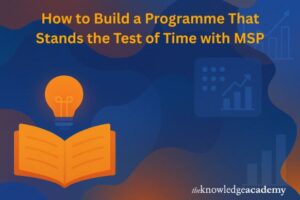
Image Source: The Knowledge Academy
Building a programme that withstands the challenges of time is no small feat, but every organisation aspires to achieve it. How do you ensure that your programme meets immediate goals and remains relevant in the long run? The answer lies in the balance between structure and flexibility.
Whether you’re delving into MSP Training or focusing on Managing Successful Programmes, the key is creating a framework that can evolve. Let’s uncover the secrets to crafting a programme that delivers value and stays ahead of the curve.
Table of Contents
- Key Elements for Building a Long-Lasting Programme with MSP
- Conclusion
Key Elements for Building a Long-Lasting Programme with MSP
Creating a programme that will last requires emphasising several key components, including sustainability, technical innovation, measured success, and ongoing education. Each ensures that your programme remains current, efficient, and flexible in changing conditions and constant challenges, which are at the heart of MSP. Here is a closer look at each of these fundamental components through the lens of MSP:
Incorporate Continuous Learning
Encouraging lifelong learning ensures that your programme remains relevant while keeping participants engaged. A programme supporting continuous education guarantees its audience stays updated with emerging trends and innovations, just as MSP ensures that programmes are adapted as strategic goals evolve.
As their needs evolve, participants can interact with new materials, certifications, or additional resources offered. By providing opportunities for ongoing development, your programme becomes a living entity that grows and changes with its participants’ professional journeys, a concept emphasised by MSP in its governance and continuous alignment with business objectives.
Leverage Technology and Innovation
The role of technology in creating sustainable programmes cannot be overstated. From the outset, consider leveraging new and emerging technologies to deliver your programme more effectively. MSP embraces this approach, integrating technological advancements to improve programme delivery and outcomes, making them more scalable, engaging, and personalised.
Explore techniques such as data analytics, virtual classrooms, and online collaboration tools to enhance the learning environment and assess programme outcomes. MSP also suggests adopting emerging trends like artificial intelligence or augmented reality to shape the direction of programmes, always ensuring that technology enhances core programme value.
Focus on Measuring Success
Without a clear way to measure the performance of a programme, what is the point of building it? MSP stresses the importance of defining clear objectives and KPIs from the start to monitor progress and ensure alignment with overarching business goals.
Key Performance Indicators (KPIs) are essential in this process. These indicators should be closely monitored to ensure you are on track and aligned with the primary goals of the programme. MSP helps ensure that these indicators remain flexible and adaptable as your programme evolves, ensuring continued alignment with the business strategy.
Create a Sustainable Framework
A programme designed to last also requires a sustainable structure supporting longevity. This means ensuring that it is financially viable, can be maintained over time, and has the necessary infrastructure to enable growth, principles found in the approach of MSP to governance and strategic alignment. Consider the future resource allocation for the programme. Will it depend on specific individuals or teams, or is it scalable enough to thrive with minimal intervention?
Consider whether the programme could be expanded or replicated; its long-term success depends on this. A sustainable framework also means fostering a sense of ownership within the company. Involving a team or community in the initiative ensures that the programme remains a priority and can evolve. Collaborative teams will help keep the programme relevant to strategic goals and ensure it remains fresh.
Foster Strong Stakeholder Engagement
Engaging stakeholders throughout the life cycle of programme is critical to its success. Building and maintaining relationships with key stakeholders, whether internal or external, ensures that the programme stays aligned with organisational goals and remains relevant to its target audience, the principles firmly rooted in MSP.
By keeping stakeholders involved, informed, and engaged, you create a sense of shared ownership and commitment to the programme. Regular feedback, transparent communication, and active involvement from stakeholders are essential components of MSP, helping anticipate potential challenges, leading to quicker problem resolution and stronger support for the long-term goals of the programme.
Conclusion
Building a programme that stands the test of time isn’t just about having a great idea; it’s about creating something that can adapt and continue to deliver value. By focusing on core vision and measurable success, you can ensure that your programme remains impactful for years to come, as MSP guides you to align your programme with the organisation’s strategic objectives.
Consider The Knowledge Academy courses to advance your knowledge of managing successful programmes and ensure your projects stand the test of time.






Add Comment